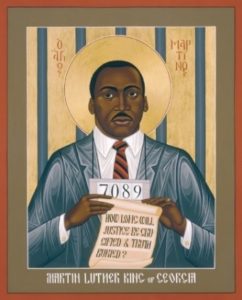Thoughts on Martin Luther King, Jr. Day
Posted By John Morgan On In North American New Right | Comments DisabledIn recent decades, Martin Luther King, Jr. (1929-1968) has become a symbol of the possibility of racial egalitarianism and the supposed victory of progressivism throughout the Western world. His birthday, January 15, which is commemorated on the third Monday of each January, has been designated as a federal holiday by the United States government since 1986 (although it was not celebrated in all fifty states until 2000). Despite the fact that King’s ideals, credentials, personal merits, and actual achievements have been widely questioned — not least by Black Nationalists, such as Malcolm X and Stokely Carmichael, who believed that his aims were detrimental to genuine black interests and identity — he has become the face of what we might term “safe” racial activism in the US, which is why he was embraced by the establishment in the first place. By this, I mean the idea, which has now long been accepted by both the mainstream “Left” and “Right,” that if black Americans were given access to all the same opportunities and resources as whites, and if whites stopped believing that there are essential differences between the races, most blacks would eventually become upstanding, law-abiding, bourgeois members of the middle class, more or less indistinguishable from other Americans except by their skin color — and certainly completely non-threatening — and could then live side by side with whites in peace and harmony for all eternity.
 [2]
[2]You can buy Alain de Benoist’s Ernst Jünger between the Gods and the Titans here [3].
Even if we accepted that King’s goal was achievable, the end result would be a society in which both black and white identity and their respective traditions and cultures would be erased and replaced by a homogenized, pacified conformity. But we don’t even need to debate this anymore, since today, more than half a century since King’s death, we have ample evidence that in spite of decades of massive legislative and economic programs to bridge the divide in both the private and governmental spheres, most especially affirmative action, black and white America remain as divided as ever, and blacks continue to be disproportionately responsible for crime and are consistently underachievers in education. The American establishment, which is now largely run by the very same people who marched with King or embraced his ideals, continues to insist that America as a society still hasn’t done enough to achieve racial equality, and that it is “systemic racism” and “white privilege” that holds black America back. The real solution, of course, which will lead to betterment for both parties, is a return to ethnic communitarianism; but don’t expect to hear that from the steps of the Lincoln Memorial anytime soon.
In the final analysis, however, King has already become something of a has-been for progressives. He remains a useful symbol for them, but in truth, the American liberal Left has long since left ideals such as his behind — today, after all, we are meant to believe that race is nothing more than a social construct, a notion that surely would have struck King as insane; also, his strong Christian beliefs and career as a minister wouldn’t win him many friends among today’s liberals. Likewise, in the age of #MeToo, given what we now know about his busy extramarital sex life, it’s doubtful that his career could have survived; today, it is more than likely that he would go down in flames with the media branding him a patriarchal, hypocritical monster. And it’s quite clear that many of today’s Leftists eagerly wish for an America in which blacks and other non-whites rule the country and exact vengeance on their white countrymen for being responsible for, well, basically everything bad that has ever happened in history. King’s famous dream “that one day on the red hills of Georgia the sons of former slaves and the sons of former slave owners will be able to sit down together at the table of brotherhood” now seems like a quaint and archaic fantasy compared to the dreams of today’s racial activists, who openly declare their contempt for white America and their intention of displacing it by any means necessary. It’s entirely possible that half a century from now, Martin Luther King, Jr. Day will have fallen out of favor, and something new and much more alarming will have taken its place. Dwayne Elizondo Mountain Dew Herbert Camacho Day? Only time will tell.
Over the years, Counter-Currents has published or republished important articles grappling with the issues raised by King’s life and legacy. Among them are:
- Kerry Bolton, “Fifty Years of Cant [4]“
- Kerry Bolton, “Martin Luther King, Establishment Icon [5]“
- Samuel Francis, “The King Holiday & Its Meaning [6]“
- Richard Houck, “Remembering Martin Luther King, Jr. [7]“
- Kevin MacDonald, “Jews, Blacks, & Race [8]“
- Spencer J. Quinn, “The FBI’s Secret Civil Rights Files [9]“
- Spencer J. Quinn, “The Truth About Martin Luther King, Jr. [10]“
- Spencer J. Quinn, “Victory in Albany: Remembering Laurie Pritchett [11]“
